To quote Douglas Adams, “Space is big. You just won’t believe how vastly, hugely, mind-bogglingly big it is. I mean, you may think it’s a long way down the road to the chemist’s, but that’s just peanuts to space.” The Milky Way is ancient, a hundred thousand light-years wide, and contains four hundred billion stars, give or take. It would be easy to misplace a particular world in space and time; a number of SFF protagonists have done so. Consider these five vintage works in which home worlds have been lost.
The End of Eternity by Isaac Asimov (1955)
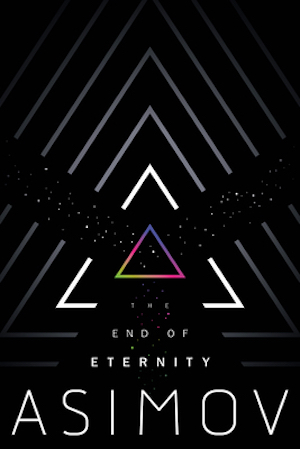
In one sense, Andrew Harlan knows exactly where Earth is. Although he and the other agents of Eternity live outside time, they can and do visit Earth almost any time they care to. Literally. The Eternals monitor and shape Earth’s history over a 70,000 century span. This paradoxically means Harlan can never return to the Earth he grew up on, because Eternity’s incessant tweaking of history to bring about a perfect, stable world means that version of Earth has long since been overwritten.
Harlan knows he can never go home. What he can do is allow himself to be drawn into an ill-fated romance with Noÿs Lambent, who is beautiful, irresistible, and as far as the skilled Eternal can ascertain, slated to be erased from history as an unintended but unavoidable side effect of Eternal tampering. Harlan is determined to save the woman he loves at any cost. Any cost may mean the very existence of Eternity itself…
***
Dumarest of Terra by E. C. Tubb
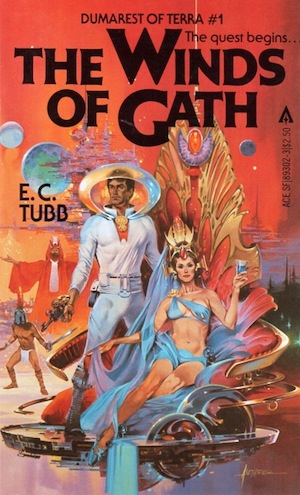
(The series has thirty-three volumes so I won’t list them all.)
As previously discussed, series protagonist Earl Dumarest finds himself in quite the pickle in the novel in which he makes his debut, The Winds of Gath. He wakes from cold sleep to discover that he has been delivered to the wrong planet. This is but the beginning of Dumarest’s adventures. He is a man driven to search for his lost home. Dumarest subjects himself to the dangers of Low Passage over and over, for it is the only way he knows to find the Earth he abandoned when he was but a young boy (stowing away on a passing starship).
Initially, his difficulty appeared to be entirely due to the scale of the galaxy and the fact Earth has a pretty stupid name (Who ever heard of a planet named “Dirt?”). But as Dumarest discovers over the course of thirty-three volumes, there is more to Earth’s curious obscurity than poor naming choices, dodgy star maps, and an over-abundance of settled worlds. Earth was hidden for a reason.
***
The Diadem Saga by Jo Clayton
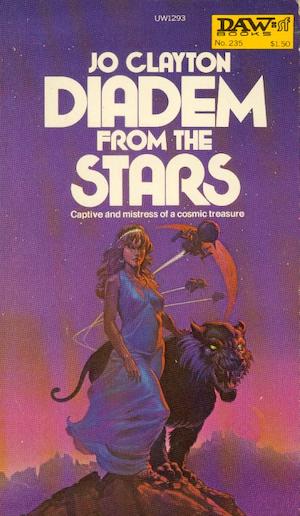
Diadem From the Stars (1977), Lamarchos (1978), Irsud (1978), Maeve (1979), Star Hunters (1980), The Nowhere Hunt (1981), Ghosthunt (1983), The Snares of Ibex (1984), Quester’s Endgame (1986)
Aleytys misplaced her home world due to no fault of her own. The child of marooned off-worlder Shareem and a Jaydugaran barbarian, Aleytys was left behind when Shareem escaped backwater Jaydugar. Aleytys’ red hair marks her as Other on Jaydugar, as do her impressive psychic powers. Life on Jaydugar is nasty, brutish, and short, which are good reasons to leave as soon as one can.
Aleytys believes that she can find a better home elsewhere. Her mother was a Vrya. The Vrya are powerful but reclusive. If she can find their home world, perhaps she can join her mother’s people.
The Vrya have made sure that they cannot be found on any star map. This fact ensures Aleytys will have to survive many exciting adventures (at least nine!) if she is to locate her mother’s home planet.
***
The Faded Sun Trilogy by C. J. Cherryh
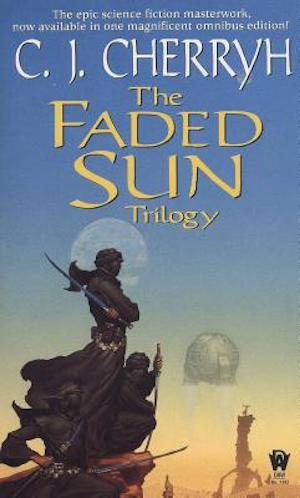
The Faded Sun: Kesrith (1978), The Faded Sun: Shon’jir (1978), The Faded Sun: Kutath (1979)
The mri mercenaries have served the regul for two thousand years, most recently fighting a losing war against humans that spanned two generations, leaving the mri close to extinction. One might think the regul would feel some degree of gratitude for this long service. Not so! The regul are very Bad Bosses indeed, inclined to blame the mri for military setbacks that were caused by regul’s own version of Dunning-Kruger syndrome. When the mri prove a minor embarrassment—Kesrith, the world they currently call home, is due to be handed over to the humans, which might mean that the surviving mri could ally with humans—the regul decide to tidy up by exterminating the thirteen remaining mri. Only Niun and his sister Melein survive.
Kesrith is a haven no more. Niun and Melein set off in the company of sympathetic human Sten Duncan. After all, Kesrith is only the latest world on which mri have settled. Their true home world may prove more hospitable. But millennia of mercenary service have obscured memories and records; the mri home world might well be lost. The quest to find it will consume years and uncover forgotten mri history, as bloody as it is disquieting.
(Yes, three of these series were published by DAW. Donald Wollheim must have loved this series-friendly trope)
***
The Hunted Earth by Roger McBride Allen
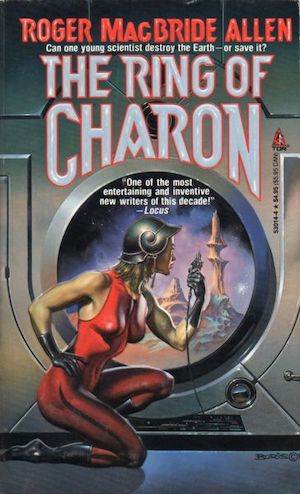
The Ring of Charon (1990), The Shattered Sphere (1994)
The bold visionaries of Pluto’s Gravitics Research Station had very high hopes for their space-time-manipulating Ring. Fame, professional adulation, perhaps even a nudge for human progress could well have been in the cards if their research had gone as planned. Inadvertently destroying the Earth was something of a setback, the kind of experimental error that could produce a sternly worded rebuke in one’s permanent file.
Closer examination revealed that the scientists had not just exterminated all life on Earth. Instead, their experiments woke…something. Ancient mechanisms relocated the Earth from the Solar System to elsewhere. All the scientists need do now is reverse engineer unfamiliar alien technology and they can plunk Earth back into its familiar orbit around the Sun. First step—deducing where the enigmatic alien mechanism dispatched our home world. Good news: it’s almost certainly somewhere in our native universe!
***
These are all works of a certain vintage. The Lost Earth (or Lost Home World) trope is alive and well. Feel free to mention more recent examples in the comments below.
In the words of Wikipedia editor TexasAndroid, prolific book reviewer and perennial Darwin Award nominee James Davis Nicoll is of “questionable notability.” His work has appeared in Publishers Weekly and Romantic Times as well as on his own websites, James Nicoll Reviews and the Aurora finalist Young People Read Old SFF (where he is assisted by editor Karen Lofstrom and web person Adrienne L. Travis). He is a four-time finalist for the Best Fan Writer Hugo Award and is surprisingly flammable.










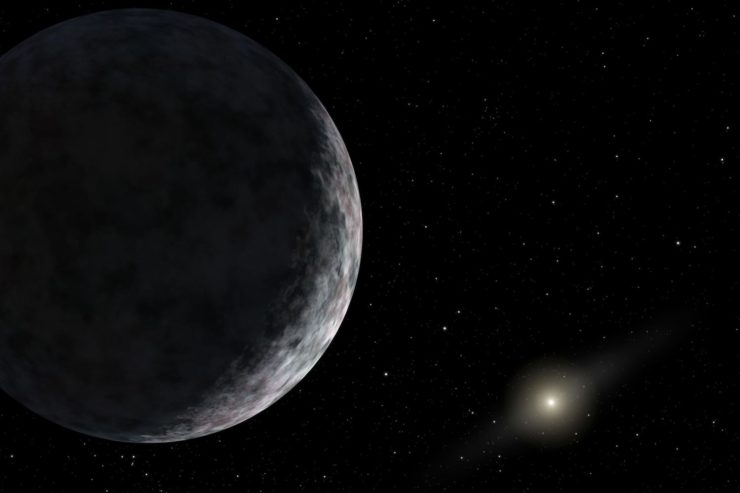
There are so many ways to interpret this concept. At first, I thought you were going to go for the Earth is forgotten as the home world of humanity. Then when I understood your idea, the first thing I thought of was more along the lines of “lost to time” like Poul Anderson’s Kith series or, I guess, Tau Zero.
Once I understood the concept (my fault, not yours), the first thing I thought of was Robert Sheckley’s Mindswap. A lot of people seem to like that one, but I think it’s one of his weaker works.
Another would be the webcomic General Protection Fault, which is currently going through a storyline where the Earth was shunted out of the universe to save it from alien invasion. Unfortunately, the protagonists are having trouble finding it again to bring it back.
Off topic, but it occurs to me that people who use the “planet called Dirt” trope (and I was once one of them) know nothing about farming or gardening. Dirt isn’t a synonym for earth. It should be a planet called Soil. There’s a difference.
What abut Earthblood by Keith Laumer? Seems like it would fit into this same era….
1: That’s an important clue! If the planet Dumarest is on has regolith and not soil, it probably isn’t Earth. Also, if the book he is in is early in the series, it is not going to be Earth, either.
The Ring of Charon‘s cover may deserve a place in the “not great covers” hall of infamy. In the Hitchhiker’s Guide, Earth isn’t lost, but the pieces are probably too small to find…
In any case, losing Earth seems to be a fairly common trope. See, for example, Dan Simmons’ Hyperion series.
The later Foundation series books cover the search for Lost Earth, although in the first one it isn’t lost. It’s apparently not known of in the Dune books, either.
Y’know, it seems rather, well, careless to misplace an entire planet.
The short story “Dream Gone Green” (1974) by Alan Dean Foster covers a search for the lost planet of Earth. The horse Pericles, a genius and a poet, teams up with a young woman to build a financial empire for funding the search. When it’s found, it’s uninhabitable. So they terraform it.
The story “The Impossible Planet” (1953) by Philip K. Dick has a similar premise but totally different theme. As Goodreads synopsizes:
Each of these two stories ends with a slightly unexpected sentence that, if nothing else, sticks in my memory.
Poul Anderson’s High Crusade eventually deals with a lost homeworld.
My favorite “Lost Earth” story is Andre Norton’s STAR RANGERS aka THE LAST PLANET
It always brings a tear to my eye, the scene near the end as the protagonists walk down the row of chairs, reading off the names therein.
There was a Poul Anderson story about humanoid aliens from a globular cluster with enough obscuring gas that they have no idea about the size of the galaxy. When they get outside their home cluster (possibly with an ftl drive) they don’t know how to get home. They need to put together a charity because there are so many worthy causes that they aren’t just going to get help without publicity.
Anyone remember the title?
Little Black Rule: this applies in a xenoarcheological sense in Traveller; the Ancients’ homeworld is unknown (and everyone in the field will tell you there’s a fair chance it was destroyed in the Final War). Also at one time in the past, it was unknown what the homeworld of Humaniti was, given that the Ancients had been planting us on worlds all over Charted Space; molecular biology eventually answered that question. (Spoiler: it’s Terra.)
(Traveller, of course, has tons of Dumarest DNA in it.)
Ha! I had the Foster in draft one but then I couldn’t find my copy of the anthology containing it to check details.
Also from Alan Dean, the “Taken” trilogy, has an abducted human causing complete upheaval of galactic society as he and the only other earth native with him (a talking dog) recruit help to find his way back to earth. I haven’t read “Dream Gone Green”, but it sounds like he had some of the same ideas with both.
David Drake’s “Ranks of Bronze” has a Roman legion sold to an alien commercial conglomerate for use as mercenaries. The original short story ends with no end in sight for them. The expansion to novel form doesn’t get them home, but has them figuring out how to get home, and how they feel about the fact it won’t be the home they left. Eric Flint’s short story “Carthago delenda est” gets into what happens after they’ve made it home, and their former employers/owners come looking for them.
9: it’s not Starfog, is it?
Lost Earth is a minor feature, not significant to the plot, of Delany’s Stars in My Pocket Like Grains of Sand. It’s a consequence of one of the themes of the book, which is that any given bit of specific knowledge that doesn’t relate to day-to-day activity is probably known to only a tiny sliver of galaxy-spanning humanity. There’s a striking passage where someone addresses the protagonist by a long series of changing honorifics. He’s puzzled but discovers that it’s a linguistic artifact from his home world — just a part of the world he’s never visited.
@8: For decades I had lost track of what book that was from, but a few years ago I found it again. A beautiful moment.
13: Thanks. “Starfog” sounds right.
There are several good stories in that Foster anthology, but “Dream Gone Green” is probably my favorite.
The RPG Incursion by Tri Tac Games has as its premise that the PCs were abducted by Space Slavers for sale on worlds that still need warm bodies to do stuff. They wake up from cold sleep and find themselves somewhere in the Galaxy. Where exactly? They don’t know. Looking for familiar constellations is made more difficult by the fact that far more stars are visible in space than in the light polluted skies of Earth.Getting home will be very difficult.
H. Beam Piper’s work had humanity emigrating to Earth from Mars, and then forgetting about it.
Aleytys might want to consider the fact her mother left her behind. Maybe she won’t be welcome by the Vry.
Brandon Sanderson’s new Skyward Trilogy would fit into this list as a more recent example. So recent in fact the third volume is still in the edit phase.
And then there’s John Varley’s “Eight Worlds” series, in which Earth is lost in a completely different sense: everyone knows where Earth is but they can’t go there.
In the early John M. Ford story “Mandalay”, an assortment of tourists to and from alternate Earths are stranded when the transport mechanism loses its ~database; they hike down a tunnel connecting portals to a wide variety of Earths, trying to find the home of each member of the party. (This is a poor explanation of a great story; I read it in an early Asimov’s and remembered it the next time I came across it, two decades later.)
As my first thought – Dan Simmons “Hyperion” books – were already mentioned, I want to expand to TV shows and bring up “Battlestar Galactica”. The remaining humans trying to find their lost world of origin Earth clearly fits. And boy, were they surprised when they found it (in the remake).
The Doctor has been known to lose his home planet of Gallifrey. Believing he had destroyed it in the Time War, he suffered terrible angst across multiple regenerations before realising it had actually been hidden away all along.
@23: Ford wrote a few stories in that setting. Your comment also reminded me of the TV show Sliders. The first couple seasons anyway, before they introduced a Big Bad and focused on that instead of finding home.
You’d think four million years in stasis after crashing mid-combat on a distant world would be enough, given stellar proper motions, to misplace one’s war-ravaged homeworld of Cybertron, but Autobots and Decepticons–whatever their other cognitive biases and scientific oversights–are evidently very very good at astrogation, via realspace or teleportation. For the various iterations of The Transformers, this particular hard-SF nuance isn’t so much “subverted” as “bypassed in favor of more exciting plot drivers,” one of which is to forget about colony worlds established during a more peaceful era, which then supply macguffins and new cast members.
@26: the other Ford stories were before the system came crashing down. (And he once said there were supposed to be more in that set, but he got interested in writing something else.)
Another searching-through-near-misses story: Sheckley’s Dimension of Miracles, in which every version seems all right at first and then starts to go awry. The punchline is that when he gets back to his (and probably our) version, it’s so crazy he just keeps on going despite being pursued by a him-specific predator that can find him much more easily when he’s out of his home.
Maybe bit late, but this one defintely belongs on the list:
In the French comic series “Valerian & Laureline, space-time agents”, —probably best known nowadays for the reasonably 2017 film— the future Earth mysteriously disappears after our heroes return from a routine mission. While the whole story of the search for the lost future Earth itself, is quite original and an exciting read, the origin of this plot point is actually even more intriguing. Because, in a nutshell, the writers wrote themselves in a corner. The first main adventure was published in 1968, but takes place in 1986, where a huge cataclysm wrecked havoc and destroyed most cities all over the world, and human suvivors are scavenging in flooded cities. Never imagining that their series would become such a huge success, they unfortunately realized 15 years later, that reality was catching up with really fast: 1986 was coming soon, and… the Earth was still not destroyed. Rather than retconning the origin stories, they devised a higher intervention and made the future Earth disappear, erasing the history and human accomplishments in Galaxity.
And whatever you might think of the movie, the comics are highly recommended. And if not for the story, than definitely for the gorgeous drawings, which according to legends, even mesmerized George Lucas back in the days when he was creating his own space saga…
I believe the Earth explodes in RAH/Spider Robinson’s Variable Star.